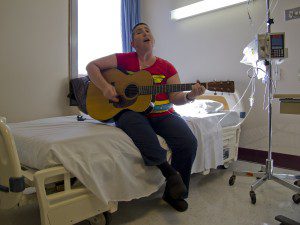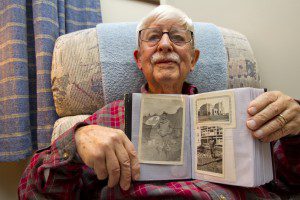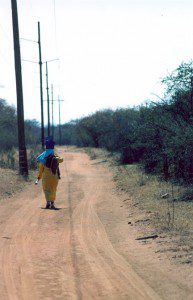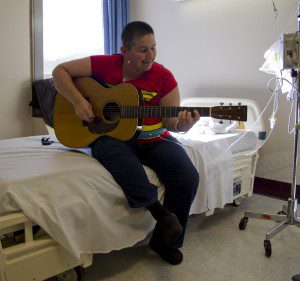 Last year, at the beginning of October, this column included the first of a series of articles about Jean Hanna Davis and her struggle with breast cancer and chemotherapy for the second time in 10 years. Hoping to inspire other women in the same predicament, Jean invited me to sit with her while she received treatment. It was a fascinating insight into the process; a mixture of boredom, nausea and anxiety.
Last year, at the beginning of October, this column included the first of a series of articles about Jean Hanna Davis and her struggle with breast cancer and chemotherapy for the second time in 10 years. Hoping to inspire other women in the same predicament, Jean invited me to sit with her while she received treatment. It was a fascinating insight into the process; a mixture of boredom, nausea and anxiety.
After that first column, we posted several more online. (You can read the series on my website.) In November, Jean finished up her chemo and celebrated with her guitar, singing while sitting on her hospital bed. Three of the songs were posted to YouTube .
In December, Jean got word that she was, once again, cancer free. It was a fantastic Christmas present. The interviews and the columns soon became the basis for a book: Keep on, Keepin’ on. It was published last spring and is available through Amazon.
In the book, we included several essays Jean wrote about October and “Pink Ribbon Month”. The following is an excerpt from one—literally from her hospital bed.
![Pageflex Persona [document: PRS0000038_00053]](https://www.booksbyeric.com/wp-content/uploads/2013/08/keep-on-front-cover-web-200x300.jpg) “I’m not annoyed so much with the pink this year. We all do this life thing differently, and that there’s no wrong way to do it….but I do get frustrated with the so-called “pinkwashing” that has happened extensively these past 10 years. Buy a pen….buy a can of soup…..buy these sneakers……OK. If you usually do buy those things, please continue. If you’re buying them because they give a “portion of the proceeds to Breast Cancer Research.” Save your money. Make a donation to Komen…or BCRF…check out charitynavigator.org to compare these charities. Know how they use your money.
“I’m not annoyed so much with the pink this year. We all do this life thing differently, and that there’s no wrong way to do it….but I do get frustrated with the so-called “pinkwashing” that has happened extensively these past 10 years. Buy a pen….buy a can of soup…..buy these sneakers……OK. If you usually do buy those things, please continue. If you’re buying them because they give a “portion of the proceeds to Breast Cancer Research.” Save your money. Make a donation to Komen…or BCRF…check out charitynavigator.org to compare these charities. Know how they use your money.
“If you have a friend who is going through chemo and you just don’t know what to do for that friend, here are some suggestions.
- Buy paper plates, plastic cutlery, napkins, paper towels…..stuff to make daily life and meals a bit easier.
- Send a card…and if you can, throw a gift card to a local restaurant in there. Or have a meal delivered.
- Head over to the house and weed the flower beds (there’s no energy for this type of activity), or offer to decorate for holidays with the kids.
- Make a phone call…but don’t be irritated if the person isn’t interested in talking at that moment. When there are kids in the house, those quiet moments are few and far between.
- Buy a pack of sour hard candy or gum (dry mouth is a big problem with chemo & radiation, as well as the nasty taste they leave in your mouth. Sour candy helps with nausea. Seriously.)
- Take their kids to church or school or scouts or whatever……
“The smallest things make the biggest differences. Keep on, keepin’ on…”
Note: Fortunately, that’s not the end of the story. After a producer saw the videos of Jean singing, she received an invitation to appear on national television. Unless something has changed between when I wrote this and now, Jean will be a guest on the Meredith Vieira talk show in New York. (Check your local listings for the time.) The actual air date of the show is yet to be determined.



